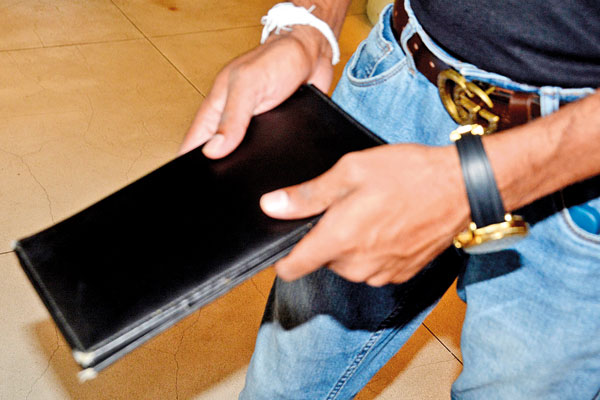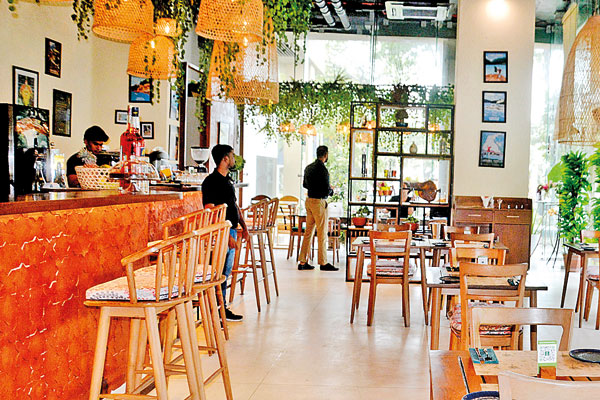News
Hospitality trade where tipping scales tip in favour of managers
View(s):By Mimi Alphonsus
In the three years Anthony (name changed) worked as a waiter, bartender and chef, service charge and tips consistently made up over 30% of his take-home income. Despite its importance, service charge and tips are a neglected area, unregulated and understudied. Their distribution is often handled by managers and with little to no transparency in the process of division, wage theft has become a problem. The Sunday Times spoke to ten workers who in their lifetime serviced 13 restaurants, hotels, and bars across the country to understand the problem.
Lalani (name changed) works at an upscale restaurant in Colombo, serving food and drinks to embassy officials, businessmen, and tourists. At the end of the month management divides the service charge giving the kitchen 50% and the stewards 50%.

Service charge and tips distinguish the hospitality industry from other sectors with more formalised salary schemes. Pix by Priyanka Samaraweera
One night in April this year, Lalani served, by herself, a table of 15 people who racked up a bill of over Rs. 180,000. Despite a Rs. 18,000 service charge being levied on that table alone, Lalani only made Rs. 3,000 in tips and service charge for the entire month of April.
“There’s only five of us servers and we all suspected that they were stealing our share,” said Lalani. “Now we keep a careful record of all our tips and service charges, but still it’s difficult to prove anything because management will simply say they had to deduct money when utensils break or get lost.”
Service charge and tips distinguish the hospitality industry from other sectors with more formalised salary schemes. According to Jayathilaka Ranasinghe, the chief organiser for the Hotel Workers Centre at the Inter Company Employees Union, the industry takes advantage of this unique factor.
“Hotels get away with paying very small amounts as basic salary passing on the burden to the customer through a service charge.” he explained “And even then, in most hotels 10% of service charge is automatically deducted for breakages and lost items without justification.”
Mr. Ranasinghe alleges that such a practice is unfair because workers’ appointment letters say service charge is included in their pay. In a letter to the Department of Labour in February 2024, the union demanded that the government ensure service charge be included in wages and take action to prevent breakage deductions.
The informality in the sector has made it difficult to challenge abuse. While working at a high-end restaurant with multiple outlets, Anthony said that service charge and tips were intentionally obscured from the workers. Service charge was pooled from all the restaurant’s outlets but because workers had no way of knowing how other outlets performed for the month they couldn’t assess if the amount they received was a fair split, he alleged.
“My colleagues and I suspected that the owner was taking a huge cut but we had no way of knowing for sure,” he said. Another waiter from a nightclub said the staff have no way of keeping management accountable because they are not shown any receipts. “We can’t do anything about it, we just take what they give us end of the month,” he explained.
But Amal Goonetilleke, the CEO of The Hotels Association of Sri Lanka said that hotels are very strict in their distribution of service charge. “Service charge is distributed to all staff equally, from the manager down,” she said, “they all get a share of the profits for that time.”
Aside from service charge, tips–a sum that customers can voluntarily give service staff–are a growing part of take-home wages and highly susceptible to misuse. Tips can make or break a service sector job.
A bartender said he and his colleagues make even Rs. 20,000 a night just on tips. “People tip but it’s not consistent, so you can’t count on it,” he said. “Tipping culture is increasing,” said another bartender and former chef who has been in the industry for over five years, “If the atmosphere in your workplace is good tip culture is great for the staff, but it all depends on how your workplace handles it.”

An official from human resources at a five-star hotel who spoke on the condition of anonymity said that after weddings or a large event, the host will often tip a lump sum to the banquet manager to distribute among the staff. “They are supposed to divide it by seniority from the manager to the intern, but it’s not uncommon for the manager to take a big chunk out,” he acknowledged.
Ms Goonetilleke explained that typically hotel management does not interfere in tip distribution and only strictly enforce service charge. “In resorts for example where customers get a package deal, they don’t carry around any cash on them even when they go to the hotel restaurant,” she said, “so tips are not significant anyway.”
Ms. Goonetilleke said that hotels cannot consider tips when determining wages, but some workers allege that tipping provides an excuse for low basic salary and underpayment. The managerial staff The Sunday Times spoke to at hotels and restaurants acknowledged that the “tip-factor” affects the market rate of customer-facing jobs and is considered when determining wages.
Hospitality work in Sri Lanka is highly seasonal, especially down south and in other popular tourist destinations. While the income during the season can be very lucrative, during off-season tips and service charge decline and workers’ take-home income reduces significantly.
According to officials at the Department of Labour, Sri Lanka does not have laws addressing tipping and service charges. It’s up to each establishment and each one has a different system, they said. They also do not keep records or data on the issue.
Trainees, who constitute a large part of the sector–typically 15-20% of large hotels’ workforce–are doubly vulnerable. Akila (name changed), a trainee at a five star hotel in Colombo who gets a Rs. 15,000 base salary said he doesn’t receive any share of tips and service charge even if a customer pays a large tip due to their high quality service.
| Running on trainees The Sunday Times found that some hotels and restaurants prefer to hire trainees because they can be paid less and be asked to work overtime without overtime pay. Typically trainees are paid between Rs. 5000 and Rs. 15000 per month making them a source of cheap, exploitable labour. “At my restaurant over 50% of the employees are trainees,” said Lalani, “Because they are new to the industry they don’t realise how much they are being manipulated to do so much work. The company is money minded and won’t hire more experienced and permanent staff.” The hospitality sector is infamous for long hours and across the board staff often work 10-12 hours on a normal day, but trainees further noted how they had absolutely no opportunity to refuse overtime work, despite not being paid for it. “One time my colleague asked to leave after his shift and the manager gave him a double shift (16 hours) on the spot as punishment,” said Anthony, “your supervisor might not sign your industrial training certificate if you stir trouble, meaning you won’t be able to graduate from hotel school, so we all know we can’t say no.” Traineeships fall under the 1978 Employment of Trainees (Private Sector) Act. The law limits trainees to working 8 hours a day and sets out minimum pay, but because it hasn’t been amended since 1978 the minimum wages are utterly out of date. Neither the National Apprenticeship and Industrial Training Authority, nor Tertiary and Vocational Education Commission regulate work hours for trainees. Long hours are steeped in the culture and trainees are encouraged to embrace it. “The hotel industry is different to other sectors,” said Nirmalie Mendis, the head of industry relations at the Sri Lanka Institute of Tourism and Hotel Management (SLITHM), “staying 2-3 hours extra is normal and we teach our students to view it as an asset rather than a complaint.” Hotel schools and government vocational training institutes, mandate industrial training anywhere from 2 months to 2 years depending on the level of certification. One programme at SLITHM provides a 3-month course after which students must complete one year of industrial training. Completion of the course makes them eligible to then apply for a diploma course which will again require several months of industrial training. In this way hotels and restaurants are provided with a steady stream of trainees which some choose to exploit. As one worker put it, those kinds of hotels simply “run on trainees.” | |
The best way to say that you found the home of your dreams is by finding it on Hitad.lk. We have listings for apartments for sale or rent in Sri Lanka, no matter what locale you're looking for! Whether you live in Colombo, Galle, Kandy, Matara, Jaffna and more - we've got them all!

